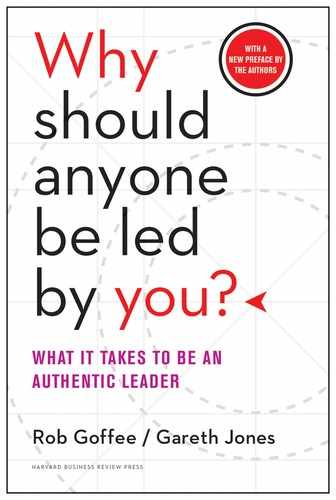NEW PREFACE, 2015
Since this book was first published, the world has experienced some significant shocks. Most obviously, the 2008 financial crisis—the biggest crisis of capitalism since 1929. The fall of Lehman Brothers and the rapid spread of financial disorder threatened the entire global economic system. The impact on businesses—small, medium, and large—has been huge. And the public sector has not been immune, either. Geopolitical change has been significant. Even as we write this, both the short- and long-term future of the Middle East seem highly uncertain. In Europe we have witnessed the rebirth of Russian territorial ambitions just as the Eurozone threatens to fall into stagflation.
Do these dramatic changes make the question “Why should anyone be led by you?” more or less relevant? Our answer is unequivocal. The need for authentic leadership is more pressing than ever. When the economic history of the global financial crisis is finally written, we will see that brave leadership on the part of political figures on both sides of the Atlantic prevented a significant recession from becoming another Great Depression. In the corporate world, great leaders have begun the process of leading us to sustained growth and continuing innovation. The world needs great organizations—and great leaders—more than ever. As for Europe and the Middle East, we await the emergence of brave and visionary leaders who can positively transform a volatile and dangerous situation.
So we are confident that the key messages of this book still resonate. In fact, the emergence of the knowledge economy has made leadership both more important and more difficult. The clever people who inhabit the knowledge economy do not, for the most part,want to be leaders—and many of them don’t want to be led! They want to be left alone to pursue their personal goals and the Next Big Thing. Yet they are significantly more productive when they are well led. We addressed this issue in our book Clever: Leading Your Smartest, Most Creative People.
Since this book’s original publication, it’s fair to say that the concept of “authentic leadership” has become a modern orthodoxy. Cynics might even conclude that authenticity has become an industry. We are, however, still convinced that authenticity, as defined in this book, differs significantly from its interpretation by others. Our argument was—and remains—that authenticity manifests itself in context and in relationships with others. It is never solely an attribute of individuals. That’s what our central theme “Be yourself—more—with skill” really means. Our book is infused with a sociological perspective, in contrast to the predominantly psychological approach taken in many accounts of authenticity.
The pressures on leaders have become greater. They have less time than they used to. They need to assess situations (a key skill, called situation sensing, we discuss in this book) more quickly. This means they must read context and think about how to re define it faster. If they don’t, social media will redefine it for them. In addition, the organizational world is increasingly characterized by geographically dispersed, often virtual teams. Leaders must achieve closeness in imaginative ways. They must identify and take advantage of cultural differences using new forms of communication. All of these changes reinforce rather than undermine the key leadership skills we discuss in this book.
Despite this concern with speed, we stress in the book that leadership development is a continuous process. Great leaders are never finished. All of us are challenged to constantly review and renew our leadership skills. Again, this is not an entirely individual task. Effective leadership development is fueled by honest, authentic conversations with others. And honesty, in many organizations, is in short supply. We address this particular challenge—how to create authentic workplaces and organizations—in our new book Why Should Anyone Work Here?
As we have talked about our ideas with many people in diverse organizations, we have urged them to find others with whom they can have honest discussions about the true nature of leadership. Our ambition is that this book will provide the questions that fuel those discussions.
The big question remains: Why should anyone be led by you?
